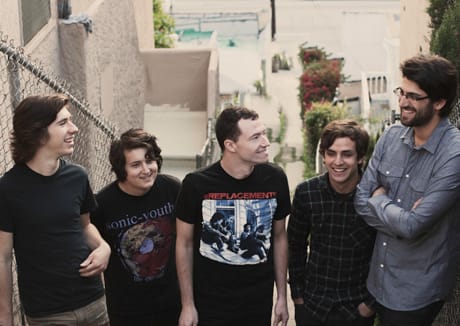If you've been exposed to Touché Amoré's caustic post-hardcore in the past, this record will offer more of what you already love about the L.A. noisemakers. If you've just heard the name in passing or you're just sad that Inkling are no longer a band, Parting the Sea Between Brightness and Me is the perfect introduction to their mixture of melody and caustic aggression. The most astounding thing about Touché Amoré, who have been pumping out an endless stream of inventive hardcore into a grateful world since their first demo in 2008, is that they write distinct songs within the often rigid confines of '90s screamo and post-hardcore. The band are clearly inspired by the likes of Saetia and their offshoots (Off Minor, Hot Cross), but they find new methods of expression within that framework, the most startling being near-ballad "Condolences," which melds a simple piano melody with vocalist Jeremy Bolm's strained scream. Generally, the band drive full-speed ahead, and the crisp production makes for the best-sounding songs of their career. Long-time fans will love this and anyone who's curious is almost guaranteed to find a new favourite band.
There are a lot of interesting things happening musically in Los Angeles right now, but is it hard to stay rooted in your scene when you start touring as much as you guys have recently?
Bolm: The L.A. punk and hardcore scene is very supportive. There are a lot of bands from California, in general, doing extraordinary things, and whether the music is similar or not, everyone is rooting for each other.
Was your last batch of writing affected by the incredible variety of shows you've played in the last year? As in, does your approach to the band change when you're not just playing the DIY circuit and are opening for bigger bands?
When it comes to writing, we just do what comes natural. There are bands we've toured with that we drew influence from, Envy, in particular. But we'd never go for a sound based on who it may appeal to.
Did your in-studio approach to this record differ from past recording experiences?
Absolutely; it was our first experience in a professional studio recording with someone who wasn't a close friend. We also tracked it live.
This record was recorded in five days. Do you think you'll ever want to spend a lengthy period of time in the studio or do you prefer to keep things quick and live?
I can't say yes or no to that. There are instances when a band are given "too much" time and the record has the ability to get weird. You may end up second-guessing yourself a lot and adding unnecessary things. We work fast and hard, and I think it has helped get the sound we have.
Touché Amoré have always had a strong visual aesthetic. Is it ever hard to find a way to communicate your ideas visually, even when you're producing your artwork? How important is it to work with labels that understand that side of the band?
Thankfully, with Nick [Steinhardt, guitarist] being a part of the music as much as the art, he draws inspiration quickly. We're fortunate to have him. He and I will get coffee and shoot ideas back and forth, and he's always chockfull of them. When it comes to labels, they understand the importance and have all been really easygoing about it. We feel very lucky.
(Deathwish Inc.)There are a lot of interesting things happening musically in Los Angeles right now, but is it hard to stay rooted in your scene when you start touring as much as you guys have recently?
Bolm: The L.A. punk and hardcore scene is very supportive. There are a lot of bands from California, in general, doing extraordinary things, and whether the music is similar or not, everyone is rooting for each other.
Was your last batch of writing affected by the incredible variety of shows you've played in the last year? As in, does your approach to the band change when you're not just playing the DIY circuit and are opening for bigger bands?
When it comes to writing, we just do what comes natural. There are bands we've toured with that we drew influence from, Envy, in particular. But we'd never go for a sound based on who it may appeal to.
Did your in-studio approach to this record differ from past recording experiences?
Absolutely; it was our first experience in a professional studio recording with someone who wasn't a close friend. We also tracked it live.
This record was recorded in five days. Do you think you'll ever want to spend a lengthy period of time in the studio or do you prefer to keep things quick and live?
I can't say yes or no to that. There are instances when a band are given "too much" time and the record has the ability to get weird. You may end up second-guessing yourself a lot and adding unnecessary things. We work fast and hard, and I think it has helped get the sound we have.
Touché Amoré have always had a strong visual aesthetic. Is it ever hard to find a way to communicate your ideas visually, even when you're producing your artwork? How important is it to work with labels that understand that side of the band?
Thankfully, with Nick [Steinhardt, guitarist] being a part of the music as much as the art, he draws inspiration quickly. We're fortunate to have him. He and I will get coffee and shoot ideas back and forth, and he's always chockfull of them. When it comes to labels, they understand the importance and have all been really easygoing about it. We feel very lucky.
